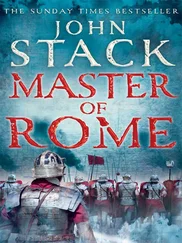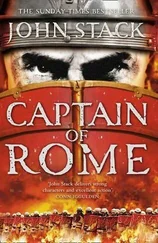Lucius responded, ‘Drum master, raise oars!’
The order was instantly repeated below in the slave decks. The drum beat stopped. The slaves threw themselves forward, pivoting their oars, lifting the blades clear out of the water.
The Aquila sped on, at first her speed checking imperceptibly. Atticus sprinted the length of the galley to the aft-deck, barely registering the terrified faces of many of the marines who had never witnessed the fury of Charybdis. To his left the churning waters of the whirlpool were speeding past the Aquila , only six feet from the hull, running counter to the direction of the trireme but not hindering her progress.
Gaius stood immovable at the rudder, his gaze steely as he sought to keep the tiller straight along the axis of the ship, the true course of the Aquila vital if she was to avoid becoming the victim of her own trap. The captain took up station beside him, his hand resting lightly on the tiller, searching for a telltale tremor that would betray any pressure on the rudder’s blade.
Atticus saw Gaius’s reaction a heartbeat before the minute tremor under his hand confirmed the helmsman’s incredible reflexes and he gripped the tiller tightly. Beneath the Aquila an unseen tentacle of current, too weak to attack the seventy-ton hull, was building against the rudder, threatening to force the blade off true. Within seconds the pressure had multiplied tenfold and the muscles in both men’s arms were tensed and flexed as they struggled to keep the tiller aligned.
Time slowed as Atticus’s mind counted the seconds it would take to sail past the whirlpool. Beside him Gaius’s face was mottled from exertion while beneath him speed bled from his galley as the enemy closed in. The sound of Lucius’s voice filled the air, sounding the ever-decreasing gap between the two galleys. ‘Seventy yards…! Sixty yards!’ and all around him the faces of the crew were frantic as they witnessed the struggle of their captain and helmsman. Underneath it all, Atticus felt the rudder shift slightly under his hand and for an instant a panic flared in his heart that he had cut his course too close to the vortex.
Hold your course, Aquila , his mind roared, trying to connect his will to the ship.
Almost within an instant the pressure on the rudder was released, and Atticus knew the Aquila was through, the waters around her hull becoming calm once more as the whirlpool fell off her starboard stern quarter. He spun around to his second-in-command.
‘Lucius, prepare to get under way. Get below decks, have all the reserves assigned plus any additional crew available. Do whatever’s required, but I need attack speed immediately.’
‘Yes, Captain,’ he replied, and was instantly away.
Atticus moved to the stern rail to watch his pursuers. Now, he grinned with satisfaction, the Carthaginians would feel the wrath of Charybdis.
The Sidon cut through the water at twelve knots, closing the gap on the Roman trireme by ten yards every five seconds. Karalis had wavered for an instant, unable to comprehend the Roman captain’s actions, before his years of command experience took over. He realized they would be upon the Roman ship within a minute. Karalis shrugged his questions aside and began issuing orders to his assembled crew.
‘Prepare for impact! Assemble the boarding party!’ They would ram the Roman galley through her stern, a killing blow, taking her rudder and holing her below the waterline. While the Romans were recovering, his boarding party would spill over the stern rail, killing the senior officers who would be stationed there. He would lead his men personally, they would spare no one, and when his ship finally disengaged, tearing her bronze ram from the hull, the Roman trireme would drag her chained slaves beneath the waves.
The gap was down to fifty yards when the Roman vessel re-engaged her oars. You’re too late, fool, the captain thought. The Sidon was at the point where the Roman crew had inexplicably raised oars. He would be upon them within fifteen seconds.
On the slave deck of the Sidon , the galley slaves were oblivious to the action above decks. Chained to his oar, each of the two hundred men was enclosed within his own private hell. For many of them, years at the oar had brutalized them and they worked in silence, their whole world focused on the constant rhythm of their oar-stroke, the backbreaking pull, the quick release to bring the oar forward, a second’s respite, the muscles straining again through the next pull. Sweat poured to mingle with fresh blood raised by the taskmaster’s lash across their backs, as man after man collapsed in exhaustion, to be savagely beaten where he fell as a reserve took his place, the unrelenting pace never abating.
The thirty rowers of the starboard fore section of the Sidon were the first to strike Charybdis. Not six feet from where they stood, on the other side of the hull, the current of the whirlpool sped past them at twenty knots. Keeping to the beat of the drum master, the rowers brought their oars forward and stuck their blades into the water in unison. Instantly the oars were ripped from their fingers as the current took hold of the blades and pushed the oars parallel to the hull. The slaves on the lower two rows screamed in agony as the oars of the upper row, fifteen foot long and fifty pounds in weight, spun on their mountings and slammed into them, killing many instantly. Within the instant marked by the drum master’s beat, the second section of thirty rowers endured the same fate, fuelling the destruction of the slave deck. The starboard side was in chaos, a mayhem of broken men. The port side never missed a beat, the rowers continuing at full tilt, completing the trap.
The air around Karalis was split by the sound of shattering timbers and cries of pain from the slave decks below him, and the Sidon heeled violently as momentum was lost on the starboard side. He ran to the starboard rail in time to see the second section of oars collapse against the hull, the air again ripped by the sound of his ship and her rowers being destroyed beneath him.
‘By the gods,’ he whispered as he saw the cause, fear coursing through him.
The ship heeled further to the right as the left-side oars continued their stroke, pushing the bronze ram into the current of the whirlpool. The Sidon was gripped as if by the hands of a god and whipped around to starboard, throwing Karalis and those around him to the deck. The archers stationed on the foredeck were thrown into the maelstrom of the whirlpool, their cries cut off as they were sucked beneath the tortured waters.
Karalis looked frantically towards the aft-deck, praying for respite but finding none. The helmsman was dead, his chest staved in where the tiller had struck him a killing blow. The Sidon was out of control.
‘You men, to my aid!’ Karalis shouted to three sailors who were lying on the deck around him, realizing that, if he did not check the Sidon’s momentum once she cleared the current, the galley would spin her stern into the whirlpool and the ship would be lost.
The sailors were dumbstruck, petrified, unable to comprehend the forces attacking their ship.
‘Now!’ Karalis bellowed. ‘Before I cast you overboard to the monster beneath us!’
They were instantly on their feet, their fear of the captain and his threats overcoming their terror and confusion. The men followed the captain to the aft-deck, the violently spinning ship causing one to lose his balance and fall over the side rail.
The force of the turning ship was pressing the rudder hard against the bulkhead, as if it were nailed to the very timbers of the ship. The three men took hold of the six-foot-long tiller and, with all their strength, attempted to heave the rudder back to true. The resistance was incredible, the twenty-knot current gripping the bow of the Sidon , causing water to rush past the stern, engulfing the blade of the rudder, transferring its energy up the shaft to fight the strength of the three men. The resistance lessened as the bow cleared the whirlpool and, although Karalis and his men fought hard to bring the rudder to true, he knew the fight was hopeless, the momentum of the eightyton galley too great. With his fears echoed in the cries of his men, Karalis felt the whirlpool grip the stern of his ship, sucking the vessel deeper into the maelstrom, dooming all on board.
Читать дальше
Конец ознакомительного отрывка
Купить книгу











